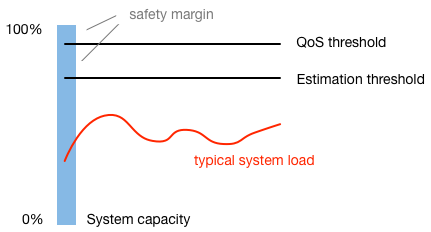This repository contains two simple Mesos oversubscription modules:
-
ThresholdResourceEstimator: Informs the Mesos master about resources that can be oversubscribed on the associated agent.Similar to the
fixedresource estimator provided by Mesos, it allows operators to configure a fixed amount of oversubscribable revocable resources per agent. However, once system utilization reaches a defined threshold, resources will be cut to the currently used amount, avoiding further scheduling of revocable tasks. -
ThresholdQoSController: Informs the Mesos agent that particular corrective actions need to be made to prevent quality-of-service violations (i.e. system overload).Following the same principle as the
ThresholdResourceEstimator, corrective actions are taken whenever the system utilization reaches a configurable threshold. The controller kills one revocable task per iteration and thus slowly corrects resource estimations that turned out to be over-optimistic.
The threshold-based approach enabled us to double the peak CPU and peak memory utilization in our Mesos/Aurora clusters. Your mileage may vary significantly, so please take this statement with a grain of salt.
Resource estimator and QoS controller aim to work in unison to ensure that the system utilization is never approaching critical levels that could negativly affect non-revocable tasks.
Revocable resources will only be offered if the system utilization remains below the estimation threshold. If utilization spikes above, no more revocable resources are offered. If it further surpasses the QoS threshold, the controller will begin to kill revocable tasks until the utilization drops. Assuming the utilization drops below the QoS but not below the estimation threshold, the freed resources will not be re-offered, thus preventing further overload of the host.
This project uses CMake. Build requires Mesos development headers and a compatible version of GCC. The Vagrant file in this repository creates a proper build environment for Debian Jessie.
Build and installation follow the usual CMake tripplet. You can use the CXX and CC environment variable to ensure that a compatible compiler is selected.
mkdir -p build
cd build
cmake ..
make
make test
make install
The estimator and controller implementations assume the Mesos agent is using the following isolation mechanims:
--isolation=cgroups/cpu,cgroups/mem # enable cgroup isolation and accounting
--revocable_cpu_low_priority # run revocable tasks with minimal CPU shares
--cgroups_enable_cfs # enforce upper limit of usable CPU shares
# (optional but recommended)To enable the oversubscription modules, launch the Mesos agent with the following flags. The given example assumes you have a host with 256000 MB RAM and 40 CPUs that you want to oversubscribe with at most 96000 MB RAM and 16 cores:
--resource_estimator="com_blue_yonder_ThresholdResourceEstimator"
--qos_controller="com_blue_yonder_ThresholdQoSController"
--oversubscribed_resources_interval=15secs
--qos_correction_interval_min=15secs
--modules='{
"libraries": {
"file": "/<path>/<to>/libthreshold_oversubscription.so",
"modules": [
{
"name": "com_blue_yonder_ThresholdResourceEstimator",
"parameters": [
{ "key": "resources",
"value": "cpus:16;mem:96000"},
{ "key": "load_threshold_1min",
"value": "64"},
{ "key": "load_threshold_5min",
"value": "48" },
{ "key": "load_threshold_15min",
"value": "32" },
{ "key": "mem_threshold",
"value": "200000"}
]
},
{
"name": "com_blue_yonder_ThresholdQoSController",
"parameters": [
{ "key": "load_threshold_5min",
"value": "60" },
{ "key": "load_threshold_15min",
"value": "40" },
{ "key": "mem_threshold",
"value": "230000"}
]
}
]
}
}'Make sure to set the memory thresholds low enough so that the operating system can maintain sufficiently large file buffers and caches. This will also prevent the Linux OOM from being triggered which could potentially kill a non-revocable task.
By default, a Mesos framework receives only non-revocable resources. An explicit opt-in is required to receive revocable resources as well. For example, for oversubscription with Apache Aurora the following scheduler flags are required:
-receive_revocable_resources # opt-in for revocable resource offers
-enable_revocable_cpus # schedule revocable jobs using revocable CPU resources
-enable_revocable_ram # schedule revocable jobs using revocable RAM resourcesThe main design goals of the threshold modules was a simple, stateless implementation. This comes with a few limitations:
-
Being based on coarse-grained load and memory thresholds, the oversubscription technique described here might not be suitable for aggressive oversubscription on systems with very latency sensitive services. If you have such a requirement, either be very conservative or have a look at Intel/Mesosphere Serenity.
-
If you run your agents with
--cgroups_enable_cfsyou need at least a Linux kernel 3.8 or later. Otherwise the systemloadused by estimator and QoS controller will not correctly account for throttled processes. Further details can be found in this LWN article. -
When the CPU is overloaded, a random un-revocable task is killed rather than the most aggressive one.
We may feel compelled to address some of these limitations in the future. Pull requests are welcome as well :-)
This repository is licensed under the Apache License, Version 2.0.

